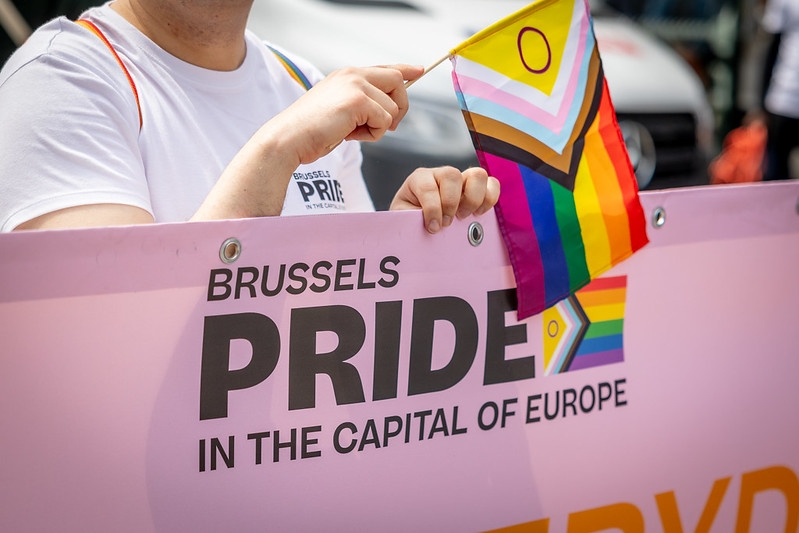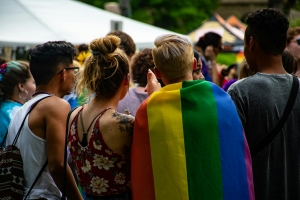18 Members States committed to pursue a European policy for LGBTIQ rights
The Belgian Presidency of the Council of the European Union (EU) hosted a high-level conference in Brussels on Friday 17 May. This date of 17 May is the International Day Against Homophobia, Biphobia, Transphobia and Intersexophobia (IDAHOT).

The event brought together the European Commissioner for Equality, the relevant Ministers and Secretaries of State from several EU Member States, members of the European Parliament, other experts and civil society organizations.
They discussed the progress and obstacles to the implementation of the current EU strategy on the equal rights of LGBTIQ people (EU LGBTIQ Equality Strategy) as well as the way forward for the next Commission. The meeting took place at a pivotal moment, i.e. just before the end of the current mandate of the European Parliament and of the current College of Commissioners of the European Commission, which for the first time includes a Commissioner specifically in charge of Equality.
The way forward for the next Commission
The meeting resulted in the signing by 18 Member States of a joint declaration on the continued promotion of the human rights of LGBTIQ persons.
The States signatories to this declaration notably undertake to implement national LGBTIQ strategies and to support the appointment of a new Commissioner for Equality when the next Commission will be formed. They also call on the Commission to pursue and implement a new strategy to improve the rights of LGBTIQ people during the next legislature by allocating sufficient resources and working with civil society.
Violence against LGBTIQ people on the rise
According to the results of the third survey on LGBTIQ people presented by The Fundamental Rights Agency (FRA), bullying, harassment and violence against LGBTIQ people have reached a new peak.
Young people and trans and intersex people are the hardest hit. Over 100,000 LGBTIQ people were surveyed across Europe. More and more people are open about their sexual orientation, gender identity, gender expression and sex characteristics. Schools also deal with LGBTIQ issues more positively. That's why Europe's commitment to advancing equality for LGBTIQ people is so important.
Implementation of the current EU strategy
The European Commission presented an overview of the implementation of the EU strategy on the equal rights of LGBTIQ people 2020-2025 (EU LGBTIQ Equality Strategy). As highlighted in the 2023 progress report, all key actions of the strategy have been launched, including a number of major legislative proposals to promote equality for LGBTIQ people, such as the Victims' Rights Directive.
The LGBTIQ conference "Pride Alliances and Policy: Towards a Union of Equality" was held simultaneously with the 10th IDAHOT+ forum, organised by the Netherlands in The Hague from 14 to 16 May.
The Belgian Secretary of State for Gender Equality, Equal Opportunities and Diversity stated that: “The Belgian Presidency of the Council of the EU has decided to put the issue concerning the rights of LGBTIQ people at the heart of the European agenda by bringing together in Brussels EU Member States’ Ministers in charge of Equality, the European Commissioner for Equality and civil society. The various figures and barometers presented this week on the situation of LGBTIQ people call for constant vigilance. I am particularly concerned about growing backlash against human rights – including the right to live in safety and peace – and against fundamental freedoms.
"This high-level conference ends with a joint declaration and a strong political message to continue the work towards the real Union of Equality during the next EU legislative term. A Union where everyone is respected as they are, or as they want to be."
On that occasion, the European Commissioner for Equality Helena Dalli said: "As politicians, we have a duty to strengthen legal protection against hatred and discrimination. This is why we adopted a law to reinforce the powers and independence of equality bodies in all Member States. We ensured that the law protects individuals from aggression including hate speech and hate crime. We have called for the mutual recognition of parenthood in cross-border situations and expect unanimous agreement on the long-awaited equal treatment directive.
"I encourage Member States to maintain the momentum created under the #UnionOfEquality going."
Director of the EU Agency for Fundamental Rights Sirpa Rautio: "The findings of our survey present a paradox. On the one hand, we see that years of efforts, policy and legislation combined with campaigning finally show some positive developments in the fight for equality. On the other hand, LGBTIQ+ people face more harassment, bullying and violence than before.
"Governments have a responsibility to protect all groups in our societies. They must act decisively to ensure that LGBTIQ+ people feel safe and live with dignity and respect."

